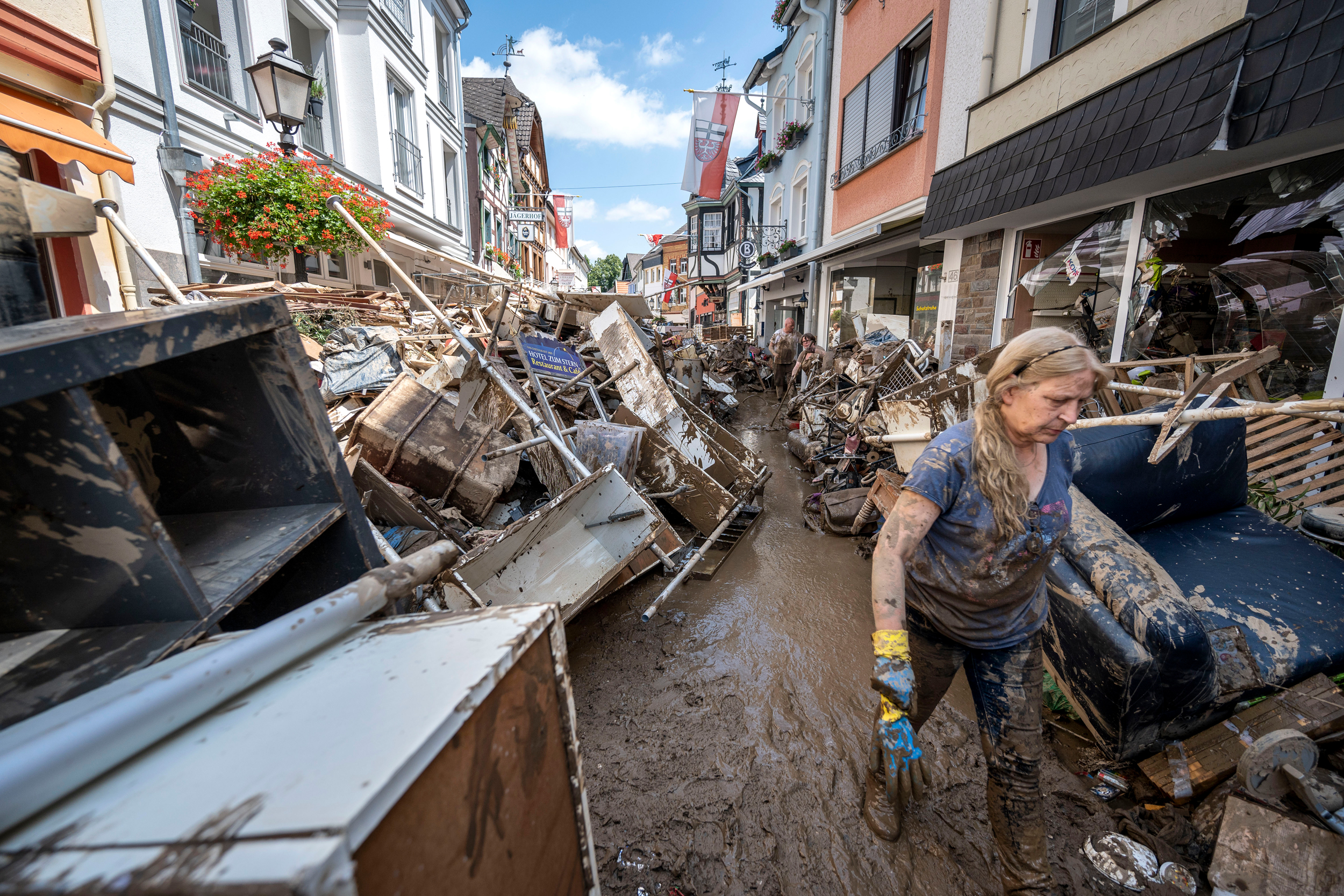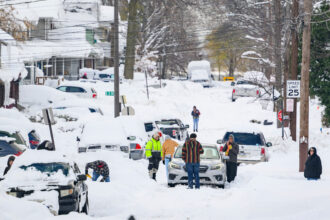A report released by the German federal government today highlights growing global climate security risks, including international political destabilization, threats to food security, conflicts over resources like water and even the potential for unregulated geoengineering projects.
“The climate crisis is the greatest security threat of our day and age,” German foreign minister Annalena Baerbock said in a statement as the report was released. “Prolonged droughts, severe flooding, dangerous storms and devastating crop failures already cause damage running into the billions each year and claim thousands of lives.”
“Once-in-a-century” disasters are now striking year after year, showing that the climate crisis is real, and that “it destabilizes societies, exacerbates conflicts over land, water and food, creates new flashpoints and increases migration, including to Europe,” she said.
Thinking about climate is central to Germany’s national security strategy, she said, and will be “integral” to discussions at the upcoming Munich Security Conference, where climate-conscious European security officials will meet their United States counterparts for the first time since American voters elected a president who has rejected climate change as a hoax.
The National Interdisciplinary Climate Risk Assessment was prepared by an independent consortium of think tanks and climate research institutes, as well as the German Federal Intelligence Service. Germany is only the second country worldwide, following the United States, to have commissioned a systematic climate and security study.
U.S. Report Serves as Model
The 2022 U.S. Framework for Climate Resilience and Security recognized that the “climate crisis poses existential threats to American lives and interests … with impacts that erode political, military, economic, environmental, and social stability.”
The Trump administration has already stepped back from identifying climate change as a national security issue by revoking the Biden Administration’s Executive Order on Tackling the Climate Crisis at Home and Abroad, Erin Sikorski, director of The Center for Climate and Security, a Washington, D.C. think tank, wrote in a January 21 blog post. Refusing to acknowledge climate risks “creates a blind spot for US foreign and security policy and ignores years of bipartisan support in Congress for addressing climate security risks,” she wrote.
The Biden-era report was notable, and served as a kick-off for Germany to do something similar, said report co-author Fanny Thornton, who studies the shifting geopolitics arising with climate change risks as leader of the GeoClimRisk project at the Potsdam Institute for Climate Impact Research.
She said the new report is an outcome of Germany’s National Security Strategy 2023, which includes sustainability and climate change as one of its three main pillars. She said that, at the very least, the report could be a conversation-starter in policy circles where the attention to climate change as a security issue has not been as significant as it deserves to be.
That could include domestic security, because climate and energy policies have been politically weaponized, contributing to increased polarization in many countries, including Germany and the U.S., she said.
“I think climate change seems to present an issue for political opportunists, particularly those more belonging to the right or far-right of the spectrum,” she said. Politicians try to drum up support by enhancing fears about inflation, and fears about how climate policies to reduce emissions could disrupt the comfortable fossil-fueled status quo, she said.
The intensifying climate crisis could fuel more extremism on both ends of the political spectrum, she added. In the past couple of years, European farmers protesting policies to reduce emissions and protect nature tried to blockade government buildings, damaging property and dumping loads of manure in the streets. On the left, activists have expressed their disappointment with climate policies they don’t believe have gone far enough to cut emissions and conserve nature by blocking roads or airports, or symbolically defacing art.
This story is funded by readers like you.
Our nonprofit newsroom provides award-winning climate coverage free of charge and advertising. We rely on donations from readers like you to keep going. Please donate now to support our work.
Donate NowSocial scientists who study climate activism have also warned that a cycle of disruptive protests meeting with increasingly draconian crackdowns on demonstrations could escalate into violent confrontations, and last year, a special United Nations rapporteur issued a report that identified state repression of environmental activists as a threat to basic human rights.
The German report also includes a section on geoengineering, which may not seem to be an imminent concern, but could fly higher on the radar in the coming decades.
“We are rapidly entering a world now where technology is the solution to everything, even more maybe driven by the big changes coming from the current U.S. administration,” she said. “For me, that is then not a very far step to the idea that technological solutions to climate change could include ones that belong in the field of geoengineering.”
The report identifies “potentially grave risks” of that path, focusing in particular on increasing discussions about trying to at least temporarily reflect some incoming solar radiation back to space by intentionally polluting the upper atmosphere with reflective sulfate aerosol particles.
“This method would not combat the actual cause of climate change (greenhouse gas concentration in the atmosphere) as the energy transition does, but merely a symptom (increase in the global mean surface temperature),” the authors wrote. With studies showing that such sun-dimming would shift precipitation patterns and crop yields, it would result in “relative losers and winners among countries.” And because an international consensus on geoengineering seems unlikely, “geoengineering initiatives by individual actors could fuel interstate conflicts without burden-sharing.”
U.S. Not Immune to the Climate Crisis
Many of the climate-linked risks identified in the German report, including the security implications of food and water crises, migration and climate mis- and disinformation, are global and affect the U.S. as well, said Tom Ellison, deputy director of the The Center for Climate and Security.
“From a national security perspective, even if you’re not particularly interested in, or responsible for things like emissions reductions, weather has always been critically important to military operations, since before climate change was a thing,” he said. Understanding how global warming is changing the baseline assumptions about weather behavior, and being able to trust that information, is important for national security, he added.
He said Trump’s disengagement from global climate policy making, including withdrawing the U.S. from the Paris climate agreement, is misguided from a security and geopolitical perspective as well as from a climate perspective.
“Even if you don’t care about climate so much, a lot of our important allies do,” he said. “So attending to their priorities and needs and competing with China are reasons to engage with those processes, in addition to the climate reasons.”
But when the U.S. withdrew from international political collaboration on climate during Trump’s first term, the issue of military resilience to climate change was not particularly undermined, “in fact, there was progress,” he said, adding that the National Defense Authorization Act recognized climate change as a threat to the national security United States for the first time when it was “signed into law by President Trump and passed with bipartisan support.”
But rescinding prior executive orders that “explicitly mandated placing climate change at the center of foreign policy and national security … and cutting off climate finance in ways that have diplomatic costs leave overseas stability risks unaddressed,” he said.
One of Ellison’s big concerns is that the next four years are critical for global climate action, and the U.S. is not likely to make as much progress as needed, he said.
“Every year we’re getting closer to blowing past the goals of the Paris Agreement, and there are worrying signs with regards to climate tipping points,” he said. “Those would have really unpredictable and potentially catastrophic or irreversible consequences for you know, society, or security, in the broadest sense.”
About This Story
Perhaps you noticed: This story, like all the news we publish, is free to read. That’s because Inside Climate News is a 501c3 nonprofit organization. We do not charge a subscription fee, lock our news behind a paywall, or clutter our website with ads. We make our news on climate and the environment freely available to you and anyone who wants it.
That’s not all. We also share our news for free with scores of other media organizations around the country. Many of them can’t afford to do environmental journalism of their own. We’ve built bureaus from coast to coast to report local stories, collaborate with local newsrooms and co-publish articles so that this vital work is shared as widely as possible.
Two of us launched ICN in 2007. Six years later we earned a Pulitzer Prize for National Reporting, and now we run the oldest and largest dedicated climate newsroom in the nation. We tell the story in all its complexity. We hold polluters accountable. We expose environmental injustice. We debunk misinformation. We scrutinize solutions and inspire action.
Donations from readers like you fund every aspect of what we do. If you don’t already, will you support our ongoing work, our reporting on the biggest crisis facing our planet, and help us reach even more readers in more places?
Please take a moment to make a tax-deductible donation. Every one of them makes a difference.
Thank you,













